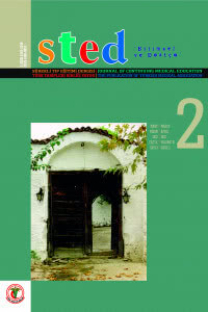Doğru ve Zamanında Tıbbi Biyokimya Laboratuvar Sonuçları, Preanalitik Hatalar
Accurate and Timely Medical Biochemistry Laboratory Results and Pre-analytical Errors
___
- 1. Narayanan S. The Preanalytic Phase; An important Component of Laboratory Medicine. Am J Clin Pathol 2000;113:429-52.
- 2. Özcan O, Güreser S. Analiz öncesi (preanalitik) hata kaynakları ve eğitimin hata önlemedeki rolü. Dicle Tıp Dergisi. 2012; 39(4):524-30.
- 3. Lippi G, Guidi GC, Mattiuzzi C, Plebani M. Preanalytical variability: The dark side of the moon in laboratory testing. ClinChem Lab Med 2006; 44(4):358-65.
- 4. Lippi G, Guidi GC. Risk management in the preanalytical phase of laboratory testing. ClinChem Lab Med 2007; 45(6):720-7.
- 5. Nar R, İren Emekli D, Güçlü K, İlanbey B. Biyokimya laboratuvarında prepreanalitik hata kavramı. Editöre mektup. Ahi Evran Tıp Dergisi. 2017;1:23-4.
- 6. TSE EN ISO 15189:2012 Tıbbi LaboratuvarlarKalite ve Yeterlilik için Şartlar.
- 7. Ekinci A. Laboratuvarımızın Preanalitik Numune Red Analizi ve Eğitimin Etkisi. Van Tıp Derg. 2019;26(1):79-84. DOI: 10.5505/vtd.2019.03521.
- 8. West J, Atherton J, Costelloe SJ, Pourmahram G, Stretton A, Cornes M. Preanalytical errors in medical laboratories: a review of the available methodologies of data collection and analysis. Ann Clin Biochem 2017;54(1):14-9.
- 9. Atay A, Demir L, Çuhadar S, Sağlam G, Ünal H, Aksun S, Arslan B, Özkan A, Sütçü R. Clinical biochemistry laboratory rejection rates due to various types of preanalytical error. Biochemica Medica 2014;24(3):376-82.
- 10.Arslan FD, Karakoyun I, Basok BI, Aksit MZ, Celik E, Dogan K, Duman C. The Effects of Education and Training Given to Phlebotomists for Reducing Preanalytical Errors. J Med Biochem. 2018 Apr 1;37(2):172-180. doi:10.1515/jomb-2017-0045.
- 11.Satılmış ÖK, Macit Y, Serteser M, Ünsal İ. Tıbbi Laboratuvarda Pre-analitik Hatalar-Örnek Alımı. Sağ. Perf. Kal. Derg. 2015(9):19-26.
- 12.Hasanato R, Brearton S, Alshebani M, Bailey L, Aldugashim S, Alothaim A, Tamimi W. Effects of serum indices interference on hormonal results from the Abbott Architect i2000 immunoassay analyser. Ann Clin Biochem. 2017 Jan;54(1):14-19. doi: 10.1177/0004563216669384.
- 13.Öz L, Koçer D, Buldu S, Karakükcü Ç. Analysis of pre-preanalytical errors in the clinical biochemistry laboratory of Kayseri Eğitim ve Araştırma Hastanesi. Türk Klinik Biyokimya Derg 2016;14(1): 6-11.
- 14.Banfi G, Salvagno GL, Lippi G. The role of ethylene diamine tetraacetic acid (EDTA) as invitro anticoagulant for diagnostic purposes. Clin Chem Lab Med 2007;45:565-76.
- 15.Dasgupta A. Tıbbi laboratuvarda doğru sonuç. Palme Yayıncılık. 2013.
- 16.Simundic AM, Cornes M, Grankvist K, Lippi G, Nybo M, Kovalevskaya S, et al. Survey of national guidelines, education and training on phlebotomy in 28 European countries: An original report by the European Federation of Clinical Chemistry and Laboratory Medicine (EFLM) working group for the preanalytical phase (WG-PA). Clin Chem Lab Med 2013;51(8):1585-93.
- 17.Carraro P, Plebani M. Errors in a stat laboratory: Types and frequencies 10 years later. Clin Chem 2007;53(7):1338-42.
- 18. "Türk Biyokimya Derneği Preanalitik Evre Çalışma Grubu. 2015, Ankara. Venöz Kan Alma (Filebotomi) Kılavuzu. Aksungar FB, Albayrak N, Coşkun C, Çınaroğlu İ, Çolak A, Demirtaş C, Eker P, Güçel F, Haklıgör A, İnal BB, Orhan B, Sönmez Ç, Şeneş M, Taneli F."
- ISSN: 1300-0853
- Yayın Aralığı: 6
- Başlangıç: 1992
- Yayıncı: -
Hacer GÖK UĞUR, Yeşim AKSOY DERYA, Ayten YILMAZ YAVUZ, Muhammet Furkan ŞILBIR, Aylin ÖNER
Hepatit B Taşıyıcılarının Hastalık Hakkındaki Bilgi, Düşünce ve Tutumları
Lepradan Etkilenen Kişilerin Sosyo-Ekonomik ve Engellilik Durumlarının Değerlendirilmesi
Sülük Terapisine Bağlı Kutanöz Lenfoid Reaksiyon
Ayşe MIDIK ÖZPAK, Emine Vildan ŞAHİN
Gebelerde Anksiyeteye Etkisi Bulunan Faktörler
Görker SEL, Aykut BARUT, Seda SOLAK, Semih USLU, Yağmur GEDİK, Seda UZUNOĞLU, Zeynep Sümeyye BARUT
Doğru ve Zamanında Tıbbi Biyokimya Laboratuvar Sonuçları, Preanalitik Hatalar
Saliha AKSUN, Huriye ERBAK YILMAZ
Depolama, Dondurma ve Çözdürmenin Anne Sütüne Etkileri
Sağlık Çalışanlarına Şiddet Haberleri: Basının Kritik Rolü
Savaş, Yanık ve Çocuk: Suriye Savaşının Hastanemiz Yanık Ünitesine Yansımaları
Hakan AKELMA, Ebru TARIKÇI KILIÇ
Melike KOÇAK, Sultan ÇELİK, Selda İLDAN ÇALIM, Seval CAMBAZ ULAŞ, Arzu KARADAL
